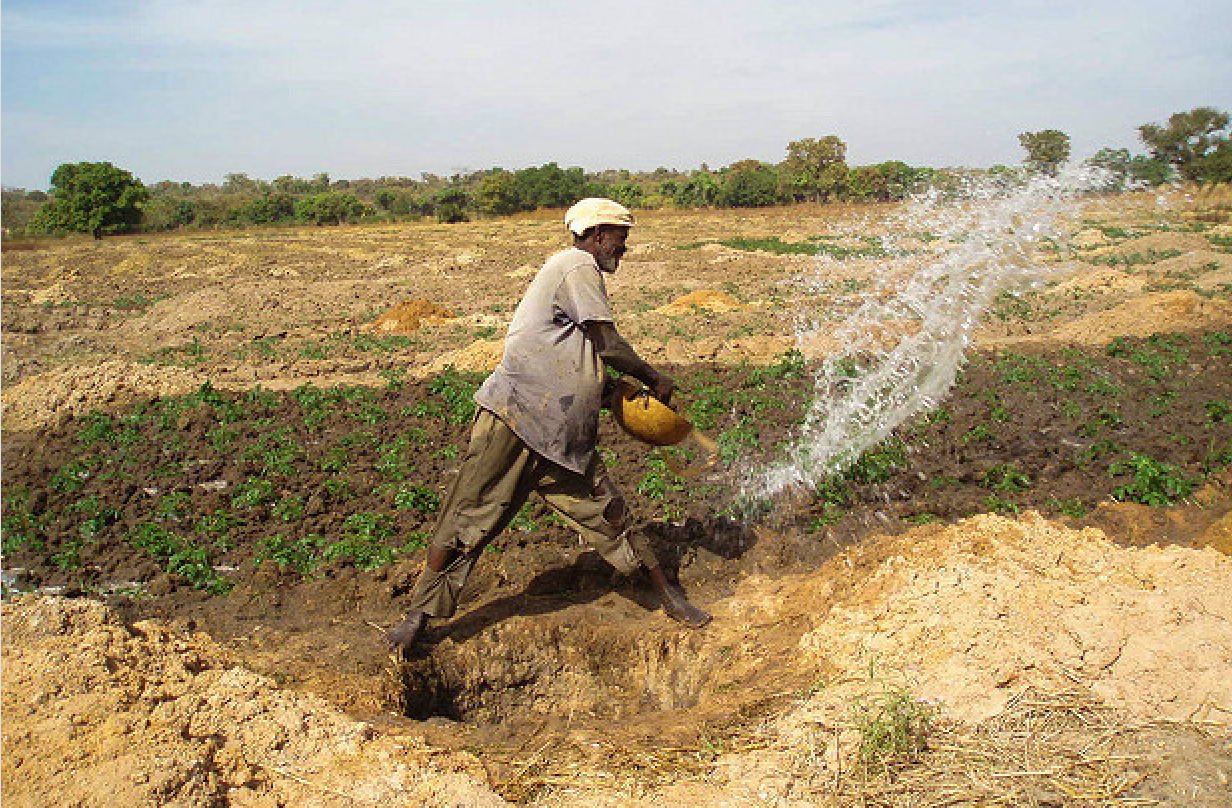The connections between climate change, the global food system, and nutrition are woefully under-acknowledged. Yet the agriculture-food system is particularly vulnerable to climate change. For many regions, especially in the global South, it will be more and more difficult to produce enough nutritious, safe food for everyone in the future. This relationship is complex: climate change threatens our ability to feed a growing planet, but the food system also contributes significantly to greenhouse gas emissions (GHGs).
A new IFPRI discussion paper, “Climate Change and Variability: What are the Risks for Nutrition, Diets, and Food Systems?”, examines these connections in order to provide an overview of the existing research landscape. The paper uses a food systems approach as it analyzes the bidirectional relationship between food and climate along every step of the food value chain, from a farmer’s seed supply to a consumer having a meal.
The greatest effects of climate change are being felt in the Southern Hemisphere, impinging upon livelihoods, mobility, health, education, and food systems. Moving forward, as planetary warming progresses, populations in the global South will continue to face the most significant consequences of a changing climate. They are often the least able to adapt to its effects, especially the rural poor in South Asia and Africa south of the Sahara.
Climate change is already affecting the food system. Reductions in yields have already been seen in some crops, such as rice and maize. By 2050, people may be forced to eat fewer fruits, vegetables, and red meat products because their availability may decline and prices may rise in response to climate change. Access to food may also be limited by climate-related vulnerabilities in transportation, storage, and processing.
The food system is not simply a victim of climate change; on the contrary, it is also a driver of climate change, contributing between 19 and 29 percent of GHG emissions worldwide. If current dietary trends continue, especially the growing preference for animal source foods as economies develop, there could be an 80 percent increase in GHG emissions from food production and associated land clearing by 2050. The challenge is to ensure everyone has enough nutritious food to eat, but to do it in a way that also protects our planet.
Climate change impacts every stage of the food value chain, with potentially adverse effects on nutrition for everyone. Women, children, and poor, rural populations will be most vulnerable to these changes. Without action, it is likely that global food production will decline by 2 percent every decade until at least 2050, just as the world’s population is expected to reach 9.7 billion people. As food becomes increasingly difficult to produce and access, prices will increase and nutritious foods will become too costly for many at-risk populations. Food safety will also be threatened by pests, diseases, and a lack of refrigeration.
Dietary changes in response to climate change will also result in a worsening of malnutrition in many places. These changes carry weighty consequences that last well beyond the individual who directly experiences food shortages or changes in diet: Future generations may be born undernourished and experience reduced growth as children, diminishing their ability to reach their full developmental and cognitive potential. Undernutrition in childhood can also predispose individuals to other health issues, including non-communicable diseases, such as cardiovascular disease, in the future. These intergenerational effects have far-reaching consequences for communities around the world.
But these negative outcomes are not inevitable. Mitigation and adaptation strategies can incorporate nutrition-sensitive, climate-smart approaches. These interventions are needed most in the global South, where the effects of climate change will be the most severe but the resources to adapt are the most limited. Food chain interventions, such as improving irrigation or drying foods to limit the need for cold storage, are crucial, in addition to broader interventions like women’s empowerment and rural development.
By the end of the Marrakech Climate Change Conference (COP 22) last November, $23 million had been pledged for technical assistance and capacity building for developing countries in various sectors, including agriculture. This is an important step forward, but more evidence-based research and action are needed. The ramifications of climate change on human health are vast. To address these, governments, NGOs, and the private sector will need to work together and improve nutrition in a climate-smart way that protects the health of people and the planet.
Claire Davis (cdavis74@jhu.edu) is a Research Program Coordinator in the Global Food Ethics and Policy Program of the Berman Institute of Bioethics at Johns Hopkins University. Jessica Fanzo (jfanzo1@jhu.edu) is the Bloomberg Distinguished Associate Professor of Ethics and Global Food & Agriculture at the Berman Institute, the School of Advanced International Studies, and the Bloomberg School of Public Health at Johns Hopkins. Jessica also serves as director of the Global Food Ethics and Policy Program. This post first appeared on the Gender, Climate Change, and Nutrition Integration Initiative (GCAN) blog.







